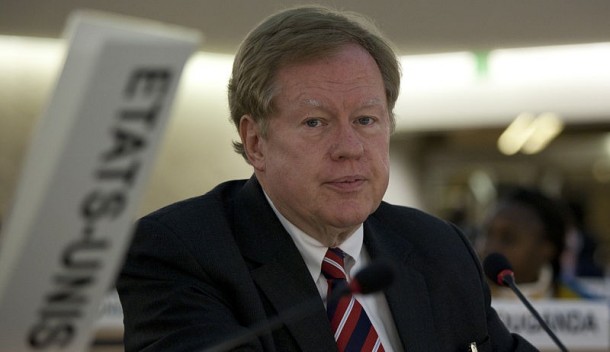TOKYO — The US envoy on North Korean human rights issues says that political and economic reforms unfolding in Burma are a great example for Pyongyang to follow.
Robert King told reporters in Tokyo on Friday that if North Korea took similar steps to Burma, officially known as Myanmar, the international community would probably respond similarly favorably.
In the wake of President Thein Sein’s reforms in Burma, Western nations have eased sanctions imposed during the previous military regime’s repressive rule, and investors and tourists have begun flocking to the country.
“I would hope the North Koreans see what’s happened in Burma and recognize that as something that’s positive,” King said. “I see Burma as a great example of where we’d like to see North Korea going,” King said.
If Pyongyang moved in “positive” directions that would allow the International Atomic Energy Agency to monitor the country’s nuclear program, “then I think there will be positive movement in other directions, as there has been in Burma.”
North Korea has vowed to push ahead with its nuclear program, and there are widespread worries that it may follow a failed April 13 long-range rocket test with a third nuclear test.
The launch came several weeks after Pyongyang had struck a deal with Washington to receive food aid in return for a freeze in nuclear activity and ballistic missile testing. The US viewed the launch as a cover for a test of missile technology and a violation of the agreement.
The rocket launch has made food aid “out of the range of possibilities right now,” King said. “Would we consider it in the future? Possibly. Are we considering it now? No.”
King, who met with Japanese government officials and flies to Seoul on Saturday, said a major concern about food aid to North Korea is whether Pyongyang would allow the US to monitor its distribution so that the food reaches those most in need, and is not diverted to the military.
King said he had seen North Korean news reports about a drought in the country. But he said that he had also seen weather reports of heavy rain in the region last week that may have eased the drought.
He said the US did not have an overall assessment of the food situation there, and that he didn’t think it was different this year from past years.
Average food production in North Korea is about 20 percent below what the needs of the population are, and Pyongyang meets the shortfall with assistance from other countries or buying grain, he said.
















